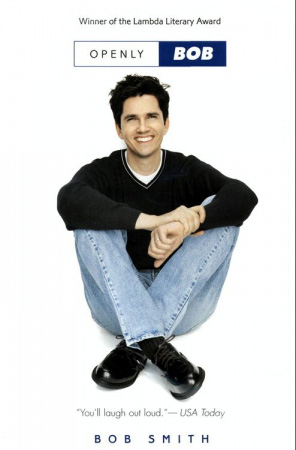 Openly Bob
Openly Bob
by Bob Smith
Published by William Morrow
Published October 1, 1997
History (memoir)
272 pgs. • Find on Amazon.com
Reviewed by Stephen O. Murray
June 18, 2001
The clean-cut all-American boy Bob Smith was probably an altar boy (as well as being an alter-boy). The son of a heavy-drinking New York State trooper and a devoutly Catholic mother, he grew up in Buffalo.
Openly Bob begins and ends with visits to his hometown, accompanied by his life-partner, Tom. They also visit Tom’s parents in their Florida retirement home, survive a hurricane that strikes Provincetown, and two bouts of couples counseling. Being a professional comedian, Smith finds plenty that is funny about these events and nonevents. Some of the quips fall flat, and he sometimes drives metaphors into the ground, but his enjoyment at playing with language is infectious, and even the outright jokes are usually based on keen perception of the absurdities of his own life and the society around him.
Smith’s humor is genial, even when aimed at attitudes and behavior that deeply annoy him. Whereas David Sedaris sometimes strikes me as vicious (though I’m sure he’d label his extremes “Swiftian” and dismiss Smith as a gay Thurber), Smith’s bile drains somewhere other than in his writing, and there is none of the desperation of some of the characters Sedaris and Bernard Cooper sketch. There’s also none of the stereotypical Catholic guilt on display, and a squeaky-clean gay life devoid of the absurdities that occur in and around cruising for sex. And though prepared for their relationship to be dissed, Bob and Tom are accepted so warmly by both their families as a couple that they have to ponder where their expectations of rejection came from.
Yet he still has material? Yes. It is provided by those who hire him as a stand-up comic and those who don’t hire him as an actor, by his adventures in searching for bargains at swap meets and birdwatching in the Rambles of Central Park, by the decorators of Florida and Santa Fe, and (the most conventional source) various culture shocks of moving to Manhattan and then to Los Angeles.
My favorite chapter is the one that verges on talking about sex (something many other gay comics focus upon, but Smith all but ignores), “A Few Notes on Sex Education.” “To help teenagers make informed decisions,” he writes, “we need to provide them with good reasons not to have sex on a first date” and suggests two:
(1) If you need immediate gratification on a first date, order dessert. Always remember: It’s easier to not finish a piece of cake than it is not to finish a blow job.
(2) Before sleeping with someone, consider trying to find out if you’re sexually compatible by thinking about them while masturbating, If you can’t make a relationship work in a fantasy, then it will never work in reality.
Such sensible advice is certainly preferable to the “sex education” to which I was subjected, or the “Just say no” admonition of later generations. Smith compares “sex education” in American schools to music education in them: “Most students of the oboe become proficient enough to use the equipment, but they never develop the ability to give anyone else pleasure.” And he ventures the following unsolicited advice to those eager to eradicate adolescent sexual conduct and to maintain ignorance under the guise of preserving a spurious innocence and/or guarantees “wages of sin” such as unwanted pregnancies and STDs:
If the goal of conservatives is to discourage young people from having sex, they should change their strategy and push to make comprehensive sexual education compulsory. Our educational system has proved that if a subject is taught in a boring enough manner, Americans will make every effort to avoid it for the rest of their lives. If homosexuality was taught in the same manner as trigonometry, even most gay people would have not use for it after graduation.
I think that this gives some of the flavor of Smith’s writing, joking around serious points.
It seems that he comes by his optimism naturally, since his mother tells his sister: “Just because you’re coming home for your father’s funeral, doesn’t mean that we can’t have fun.” As for weddings, he professes,
I’m in awe of anyone who gets married. Standing in front of your family and friends and vowing to love someone for a lifetime is a courageous act of daring in an age when most people are afraid to promise to pick up someone from the airport.
Then there are toupees, which he judges a bad bargain because they don’t fool anyone about baldness and reveal their wearers as idiots.
The book is not a string of one-liners (though I couldn’t resist reproducing a few of my favorites). It is a collection of keenly observed essays on a number of facets of American life (in a range of places I’ve already enumerated). They are connected primarily by how Bob Smith sees and describes the world, but most of the book coheres around one monogamous gay couple and their extended families (“The terms ‘immediate’ and ‘extended’ are apt because my immediate family can cause instant mood swings and my extended family is better kept at a distance”).
Although relentlessly breezy in style, the book is framed by a moving tribute to his parents.
published on epinions 18 June 2001
©2001, 2016, Stephen O. Murray
P.S. Fom a review of Treehab (University of Winsconsin Press, 2016) I learned that Smith was diagnosed with ALS (Lou Gehrig disease) in 2007 and can no longer speak.

